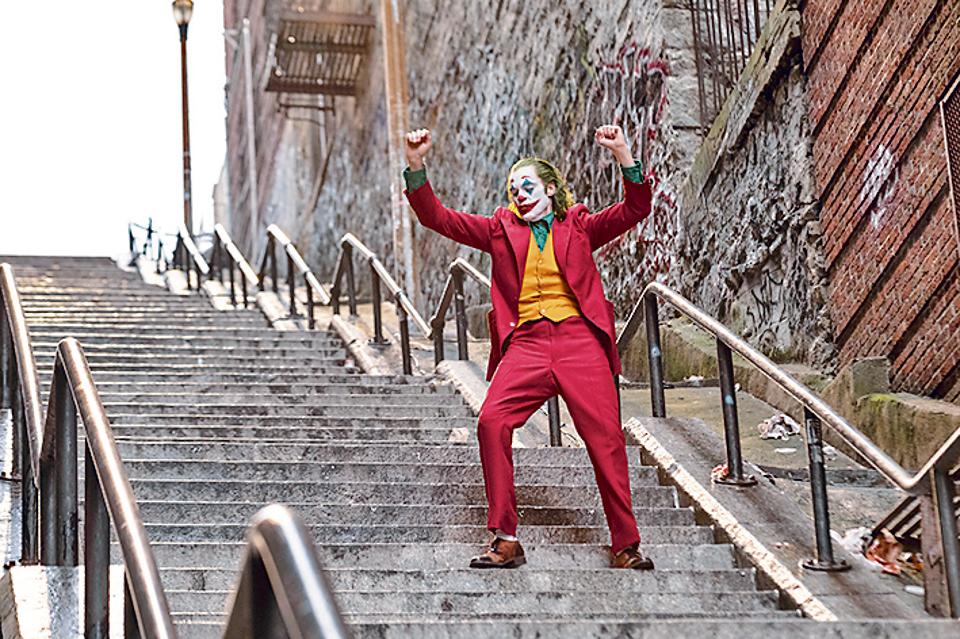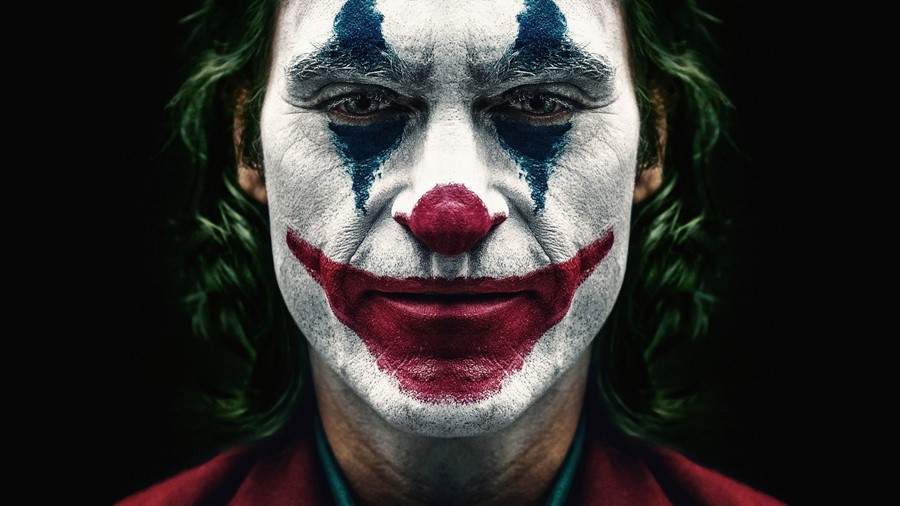“Joker” Ignites Social Controversy
November 28, 2019
October’s hit movie, ‘Joker’, is an off-putting, highly controversial, yet spectacular film, worthy of an Oscar. Despite the hordes of public scrutiny and an FBI warning, the revered movie has proven to be a sensational, winning numerous awards, and generating a whopping billion dollars, making it the highest-grossing R-rated film of all time.
Set in the gritty, rat-infested streets of Gotham, the film paints the dark picture of Arthur Fleck (Joker) and his depressing life. Director Todd Philips fashions a compelling story of a deranged, mentally ill loner who eventually spirals down into the sick monster we all know. Plagued by a freakish neurological condition, causing uncontrollable bursts of hysterical laughter, Arthur dwells in his plight day after day. He works as a clown, performing shows and making little kids laugh. He’s never been happy a day in his life.
The truth is, no one cares for him. It doesn’t help that his constant alienation from society germinates his feelings of frustration and self-loathing even more. He feels worthless. And when you feel worthless, when you’re poor, when you have nothing, and especially when you’re mentally unstable, it’s easy to plummet into the drowning pit of violence.
So after being given a gun by a friend, that’s exactly what happens. After his first taste of murder, it goes downhill from there. Arthur falls in love with killing, and there is no going back. He flushes away his last bits of love and sanity because he discovers a new passion: the absurdity of murder. The fun-loving Arthur Fleck transforms into a fed-up sadist who utilizes mayhem and chaos to cope with his insanity.
But hold up… who really is Joker? Is he just a psychotic killer or does the movie hint at something more?
Joker, played by the phenomenal Joaquin Phoenix, conveys more than a nihilistic killer. The intricate character sparks a conversation about polarized views on racism and classism. Thing is, many critics strongly disagree. They contend that “Joker” inspires mass shooters. That the movie is racist and far too unsettling. But ultimately, that the movie invokes an unpalatable fear; the Joker’s almost sympathetic origin story, according to writer Tasha Robinson of The Verge, is a “full-blown justification for the hell he [Joker] creates.”
America is being torn apart by mass shootings, and some argue that Joker is only urging it. In 2012, there was a mass shooting in Aurora, Colorado during a midnight screening of The Dark Knight Rises. The film, starring the infamous Heath Ledger (Joker), was said to indirectly encourage a gunman, allegedly dressed as the Joker, to opened fire. In the end, 12 people died and 58 more were injured. Years later, people are still pinning the mass shooting on The Dark Knight Rises, and it’s over-the-top violence. Now, with the new Joker, the fear is rising up again. Sandy Phillips (no relation to Todd Philips), whose daughter was killed in the Aurora shooting, is convinced that Mr. Philips’ Joker is encouraging “that one person out there who’s on the edge of becoming a mass shooter to act.” Point taken. But according to journalist Robert Evans, host of “Behind the Bastards” podcast, “the Aurora shooter didn’t dress up as the Joker… it was all misinformation put out by an on-duty cop.” There is no evidence supporting how these “violent” Joker movies are inciting actual violent acts!
But even if some sick Joker fanatic decides to shoot people, how can people pin that on Mr. Philip’s art? He even told APNews, “movies are mirrors of society, but they’re never molders.” Anyone making the active choice to commit mass murder is responsible for their own actions, and it would be unjust to shackle Mr. Philips’ movie to the cause.
“We tried to paint Joker with a realistic brush,” said Mr. Philips. The truth is, there are people out there who are poor, mentally ill, and henceforth fall into crime; Joker gives this issue a platform. For me, this film is a brave move in this day and age where everyone is offended. Philips even told TheWrap’s editor-in-chief, Sharon Waxman, that he “told Joaquin to ‘look at this as a way to sneak a real movie in the studio system under the disguise of a comic book film!’” That’s not only gutsy, but nifty.
Unfortunately, the public’s dislike keeps unraveling. According to Vanity Fair, “Joker portrays Arthur Fleck’s hunt for a sense of purpose and belonging as something viewers are supposed to agree with.” Furthermore, The Telegraph decries how the film pressures people to sympathize and “root for” Joker. While this nonsense is notable, it is also exaggerated and one-sided. In no purposeful shape or form is the film an endorsement of real world violence of any kind. Portraying Arthur as a hero was never the filmmaker’s intent — that’s a misconception. The reason Joker was made, according to Todd Philips, was to start a conversation about violence, guns and mental illness because these dire topics were in need of light.
Even so, the scrutiny continues…
New York Times writer Lawrence Ware presents us with his superb and wildly interesting take on Joker. While I don’t fully agree with his argument that dissects all the (PC) racial controversy in the movie, the level and way in which he analyzes the movie is luring and insightful. In a nutshell, Ware believes that Joker shows the “delusions that many white men have about their place in society and the brutality that can result when that place is denied.”
A black man with the same conditions as Arthur would probably be cast out of society, ending up on the streets or in jail, as a study from Duke Medical Center shows. If Arthur was black he would likely be homeless and invisible. It would be difficult for a black Joker to “incite an entire city to rise up against the wealthy,” writes Lawrence Ware.
If we examine Arthur’s interactions in the film, many of them are with black women… The social worker he sees early on? The protective mother on the bus who snaps at Arthur for playing peekaboo with her son? The single-mother Arthur falls in love with? And at the end, the psychiatrist he sees in Arkham Asylum? They are all black women…
But he doesn’t only interact with black females. Fleck kills white men as well. According to Ware, it’s because he cannot access their status and is “ostracized by them.” A stretch, I know, but Ware even says how since the black female victims are so invisible, the film doesn’t even bother to show their deaths. While I don’t agree with this, it’s safe to say that Joker is replete of ambiguity, and it’s these mysterious theories that make the movie so outstanding.
So, does Philips hope that everybody loves the film? Of course not! “We [filmmakers] didn’t make the movie for everyone,” says Philips. “Anytime anyone tries to make a movie for everyone it’s usually for nobody.” This movie isn’t some shoot-em-up blockbuster film that has a feel-good generic message. It’s controversial and juicy. It stirs up arguments and theories, and for me, that’s what a good movie is supposed to do.

Luca (author) • Nov 30, 2019 at 5:59 pm
Adi, error on my part, I got confused with the movie titles.
Adi • Nov 29, 2019 at 6:40 pm
The film, starring the infamous Heath Ledger (Joker), was said to indirectly encourage a gunman, allegedly dressed as the Joker, to opened fire – No, the film did not star Heath Ledger. Obviously not, as he was quite dead at this point. Rather, the gunman was dressed as Bane (Tom Hardy, not Heath Ledger). Please do you research before you write. I understand your passion for this topic but things like this come off as poorly researched and not well thought-out.
Kevin Callahan • Nov 29, 2019 at 2:59 pm
Great work Luca! Well-written, informative, with a bigger-than-just-a-movie theme. I haven’t seen “Joker” yet, but I certainly will, after reading your review!